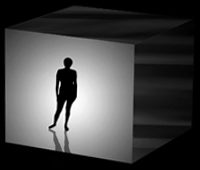Loose Minds in a Box
April 15th, 2005 - April 17th, 2005
Categories: Applications, Multimedia, Networking, Sound Art, Video / Film, VR Art

About
It was like a page from history. One could imagine seeing Alexander Graham Bell speaking, for the first time, through a strange black device to his assistant Watson, “Mr. Watson, come here. I want to see you.” In a recent and similar experiment, Charles Nichols, Professor of Music at the University of Montana, Missoula, sits in front of his desktop computer and tells Many Ayromlou, Research Engineer at Ryerson University, Toronto, Ontario, CA, who is sitting at the MIDI control keyboard, to play high C. He presses the key in Toronto and the sound jumps out in Missoula.
This is just a small example of some of the exciting preparations in process for Another Language’s latest excursion into the fascinating merger of art and technology. Another Language celebrates its 20th Anniversary with its newest production of InterPlay: Loose Minds in a Box. This InterPlay is a multi-faceted telematic event that consists of six simultaneous performances that occur in six states throughout North America. The performances incorporate theater, text, music, performance art, virtual reality, and motion capture and are concurrently captured, mixed, digitized, encoded and streamed onto the network.
Loose Minds in a Box is a collaborative work that explores the basic concept of the “box”. The box is a metaphor for the physical, social, political or psychological constraints that we and/or others place upon us. The box also represents a sense of place in the realm of the virtual as well as in our sub-conscience. With the aid of performance artists, electro-acoustic musicians/composers, virtual reality and motion capture artists / technologists and others, we look at many of the numerous representations the “box” encompasses. In Utah, Another Language’s Artistic Director, Beth Miklavcic, will perform in a closet, investigating how our personalities are bounded by the clothes we wear. Sculptor, Eric Brown, will slowly construct an enclosure around himself depicting how we encase ourselves in a social fortress. It either protects us from unwanted human contact or keeps us from interacting with the outside world.
In Maryland, Nadja Masura plays with the box that we live in. Using video processing techniques, Nadja will place remote performers into different rooms of her favorite doll house. Nicholas Bartoli and Brian Buck will dance within the constraining characteristics of the video box as well as augmenting Beth Miklavcic’s “clothes encounter” by changing their personalities with new fashions.
A team of artists in Indiana include Dioselin Gonzalez (VR designer), T. J. Rogers (motion performance), Carol Cunningham (choreographer), David Sigman (graphic designer) and Joe Hayes (dancer). They will delve into the virtual box where a performer transmits him self through a bazaar world of unique characters and environments, created by Miho Aoki in Alaska and David Sigman. At times, Joe Hayes will remotely control, through movement, electro-acoustic music in Montana.
The concept of confinement will be explored by artists Tina Shah and Helen-Nicole Kostis in Chicago, Illinois. The audience will participate by imprisoning the performer and witnessing the physical effects of isolation while at the same time viewing the metamorphosis of the performer’s psyche in a VR world.
Charles Nichols, composer and violinist in Missoula Montana, will probe the musical possibilities of the “black box”. Scott Deal, composer and percussionist in Fairbanks Alaska will toy with numerous box icons such as a music box and Pandora’s box. The music is transmitted to all sites in real time, providing the entire work with piercing percussion and wild melodies.
Back in Utah, Director Jimmy Miklavcic, will wrangle more than twenty video streams from all six sites, mix and process them for the local Utah audience and then stream the processed videos back onto the Internet for audiences at the other five sites. Local audiences at all sites will experience the local performance with the infusion of live multimedia and video events.
Additional technical support is provide by Paul Mercer and Bill Brody (Alaska), Dwight McKay and Mike Bass (Purdue), Sam Liston (Utah), Chris Rosenthal and Gideon Goldman (Illinois), Robert Wachtel (Montana) and David McNabb (Maryland).
Another Language, in collaboration with all the participating artists and technologists, is forging a new performance form not yet experienced here in Utah. InterPlay: Loose Minds in a Box is the most innovative merging of Internet technology with the performing arts to date. The form brings together artists from unique backgrounds and geographical locations that would normally never occur under traditional collaborative processes. The power of the Internet and video conference technology enables and empowers this consortium of artists to expand their ideas of artistic creativity. The performance can be viewed on the Access Grid at the new ArtGrid virtual venue in the Theater and through QuickTime at www.anotherlanguage.org/interplay.
Loose Minds in a Box is supported in part by the University of Utah Center for High Performance Computing, University of Alaska, Fairbanks, Arctic Region Supercomputing Center, University of Montana, the University of Illinois, Chicago, Purdue University, the University of Maryland, the Zoo, Arts and Parks Program, the Utah Arts Council and the Salt Lake City Arts Council and contributing members of Another Language.